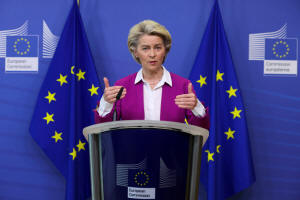|
The
vaccines had gone to more than 150 countries, and the EU had
exported as many doses as it had distributed to its own
citizens, von der Leyen added in a statement.
The bloc started exporting vaccines at the start of the global
roll out at a time when other major producers such as the United
States were building up their own supplies and restricting
exports.
Most EU exports have been directed to bigger economies,
including Japan, Turkey and Britain, who had contracts with
vaccine makers based in the bloc.
Sales and donations to poorer nations have so far made up a
small proportion of total exports, but the bloc was planning to
distribute at least 500 million shots to the most vulnerable
countries in coming months, von der Leyen said.
Half of these doses would be supplied from a new contract that
the EU wants to have with a producer of messenger RNA vaccines,
officials said. The other half will be donations from EU states
who have already bought vaccines.
The bloc has already signed supply contracts with mRNA vaccine
makers Pfizer-BioNTech for a total of up to 2.4 billion doses
until 2023 and with Moderna for up to 460 million doses.
The EU set up a vaccine export control mechanism in late January
to monitor the outbound flow of shots from the continent.
Although the mechanism allows the EU to block exports in the
event of insufficient domestic supplies, it has been activated
only once to prevent the shipment of 250,000 AstraZeneca
vaccines to Australia in March at the height of a dispute with
the Anglo-Swedish firm about its supplies to the EU.
(Reporting by Francesco Guarascio @fraguarascio, editing by
Marine Strauss, Ed Osmond and Andrew Heavens)
[© 2021 Thomson Reuters. All rights
reserved.] Copyright 2021 Reuters. All rights reserved. This material may not be published,
broadcast, rewritten or redistributed.
Thompson Reuters is solely responsible for this content.

|
|




